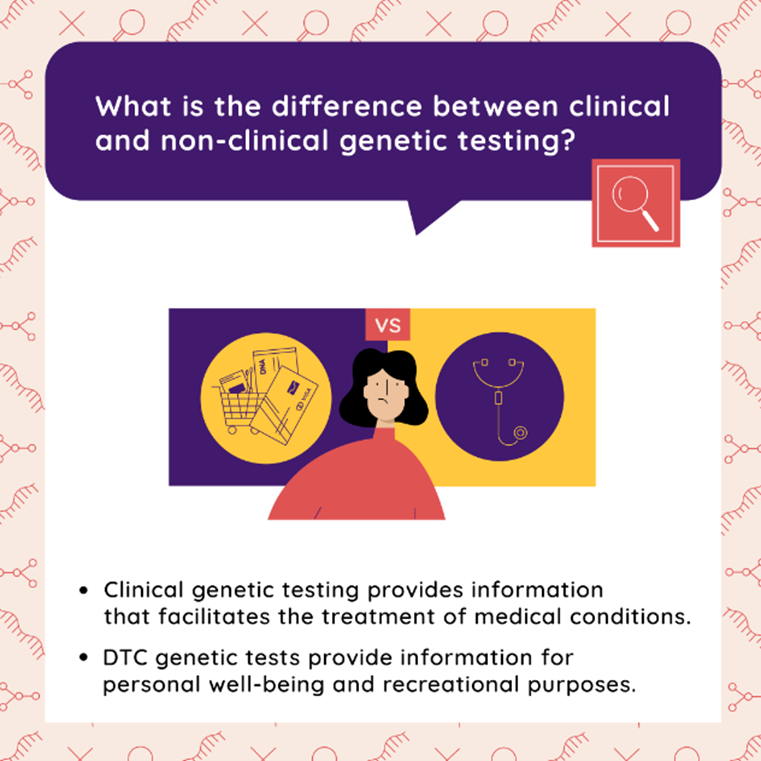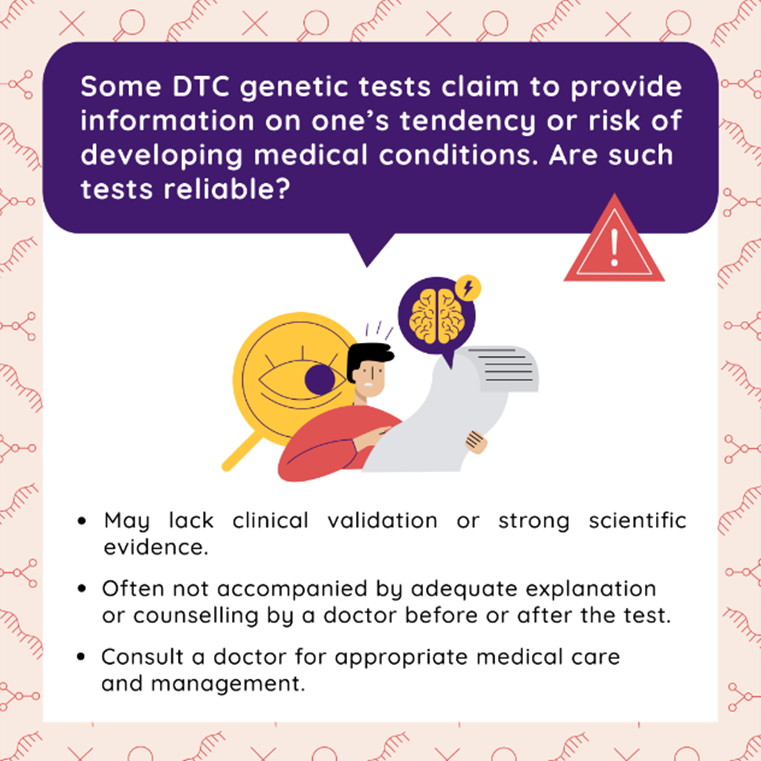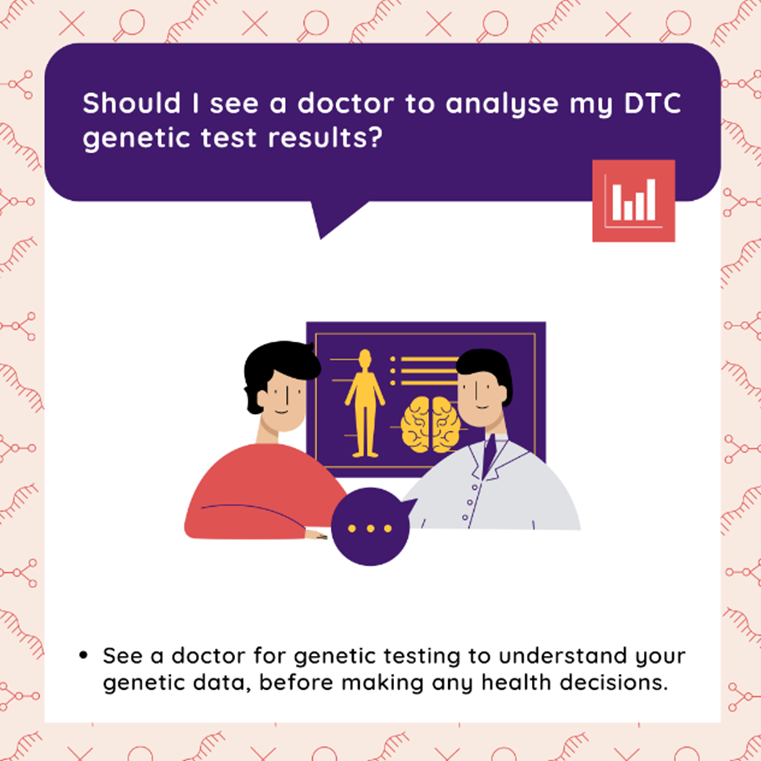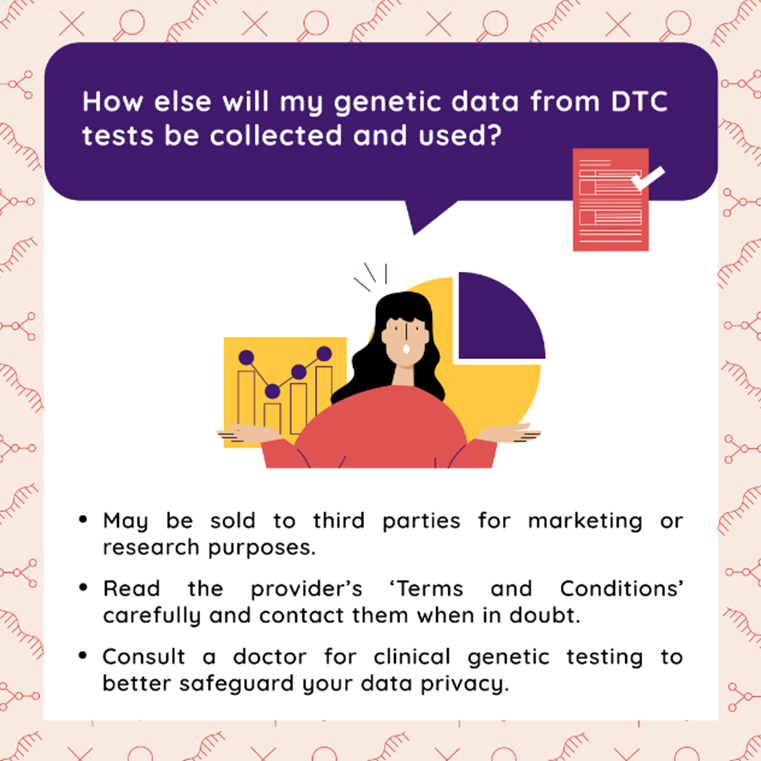What is Genetic Testing?
Genetic testing is used to study an individual’s DNA, RNA, genes, chromosomes and/or gene products.
There are two types of genetic testing: clinical and non-clinical genetic testing.
What is the difference between clinical and non-clinical genetic testing?

| Clinical genetic tests | Non-clinical genetic testing |
- Used to predict, diagnose or guide treatment of medical conditions (e.g. predictive or diagnostic testing for cancers)
- In Singapore, only doctors are allowed to offer clinical genetic testing, subject to regulatory standards
| - Used for personal well-being and recreational purposes (e.g. ancestry, personality, behavioural or nutrigenomic testing)
- Though more commonly sold online, such tests can be accessed through local and overseas stores
|
Direct-to-Consumer Genetic Tests
Direct-to-Consumer (DTC) genetic tests can be purchased by consumers directly from the provider without the involvement of a doctor. These tests are generally non-clinical genetic tests and usually accessed from local, overseas or online stores. Consumers who purchased a DTC genetic test kit are usually required to send a DNA sample (e.g. a cheek swab or saliva sample) to the company for analysis before the test report with the genetic information is sent back to them.
Read on to find out more about genetic testing and the specific risks associated with DTC genetic testing to better protect your welfare, safety and privacy.
What should you take note of if you use DTC genetic test kits?
As DTC genetic tests are increasingly used by consumers for general wellness and recreational purposes, it is important to take note of the following when using DTC genetic tests:
Some DTC genetic tests may be clinical in nature despite having disclaimers such as ‘the test does not diagnose or predict any health conditions or recommend medical action’. Consumers should exercise caution.

While DTC genetic tests available in Singapore are usually non-clinical in nature, some DTC genetic tests offered by overseas providers may actually be clinical in nature based on their purported claims. For example, some test reports may contain information about the genetic risks of certain medical conditions, which could be misinterpreted by consumers as diagnostic genetic testing (i.e. clinical genetic testing). Consumers might also misinterpret this to mean that they might be susceptible to developing certain diseases. In addition, certain advice or recommendations in test reports may be ambiguous and not meaningful for consumers.
These DTC genetic tests which appear to be clinical in nature may not be based on strong clinical or scientific evidence as they lack clinical validity (i.e. how accurately a test identifies whether a patient has a medical or genetic condition) and/or utility (i.e. how useful a test is in providing information that enables the doctor and patient to make decisions) and may carry exaggerated claims about your health or effect of genes on your health. Consumers are strongly advised to exercise caution when using such genetic tests and should not regard the DTC genetic test results as medical information or advice.
Talk to your doctor before using the kit, or consult your doctor when in doubt
DTC genetic test results may not be reliable. See a doctor for advice.

Be cautious when interpreting DTC genetic test results, as they may not be reliable. You should approach your primary care doctor for advice on any health concerns. As your genes are often not the sole determinant of a trait, your doctor will make a holistic assessment before ordering the appropriate test, explain the test results and advise you on appropriate follow-up management, so that you can make an informed health decision.
Genetic data from DTC genetic tests may be sold to third parties. Read the provider’s ‘Terms and Conditions’ and contact them when in doubt. Consult a doctor for clinical genetic testing to safeguard your data privacy.
Genetic data from DTC genetic tests may be sold to third parties for marketing, service evaluation or research purposes. As your genetic information is similar to your family members’ genetic profile, this will not only affect you but also your family members who may not have consented to the sharing of such data.

To safeguard your privacy, you should read the provider’s “Terms and Conditions” carefully and look out for:- The measures the provider has put in place to keep your information confidential
- The purposes for which your information will be used or disclosed
- Information on what will happen to your data if the provider ceases operations
- The option to request for your information to be deleted from the provider’s database
When in doubt, contact the provider to get more information.
When in doubt, contact the provider to get more information.
Frequently asked questions (FAQs)
- Can I use DTC genetic testing for relationship/paternity testing for the purpose of Singapore citizenship application?
As DNA relationship testing is considered non-clinical in nature, consumers are strongly advised to exercise caution when using them. You may refer to the article above on how to make safe and informed decisions about non-clinical genetic testing. You may also visit any polyclinic or private medical clinic and seek a doctor’s opinion for the type of genetic testing required, and any other health-related concerns.
- As consumers are advised to only access clinical genetic tests via doctors, does MOH have a recommended list of hospitals/doctors that provide clinical genetic testing services?
MOH does not prescribe the list of hospitals/doctors providing clinical genetic testing (CGT) services as CGT services are provided by various specialties depending on the patient’s health concerns or medical conditions. You may visit any polyclinic or private medical clinic and seek a doctor’s opinion and referral to the appropriate specialist. Alternatively, you may also enquire directly with the service provider on the scope of services/testing available and arrange for an appointment.
Contact information
If you have further queries or would like to seek clarification on DTC genetic testing, please contact MOH via email at eLIS@moh.gov.sg.
Related Topics